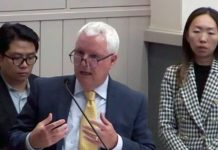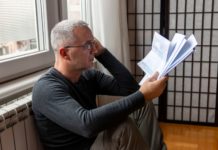
South Pasadena is projecting a $1.6 million shortfall in the budget year ending June 30 due to COVID-19 related reductions in sales tax and other receipts. The total for coming budget year projects an additional $3.6 million. That was the news awaiting the City’s newly named officers of South Pasadena’s Finance Commission as it convened Wednesday morning for a special meeting—its first-ever virtual meeting and its first get-together since Feb. 20, when the world was quite different.
While revenue from property tax, which supplies about half the city’s $28.6 million general fund, is projected to remain relatively stable, the same is not true for sales tax, which brings in about 8 percent, or $2.4 million. “Most of the businesses on Mission Street have closed, and those that can remain open continue to struggle,” the city said in a 12-page report presented during the meeting.
The city is functioning well and is open for business, City Manager Stephanie DeWolfe told the City Council last week. “But the budget is a significant concern.” She said the city has already experience “a large loss” in revenue to date because of the “safer-at home” order over the past four weeks and there are at least four more weeks to go. Finance Director Karen Aceves told the Council the city had already sustained an estimated $80,000 in Covid-related costs that it hopes will be reimbursed under various state or federal emergency statutes.
The city is now projecting a 17 percent drop in user fees for this fiscal year, 13 percent in sales tax receipts, and 29 percent in other fees. It is planning for even larger decreases in fiscal ‘20-‘21, though it is unclear if that includes the at least one million dollars in planning and building department fees the city is slated to get–barring any further complications–from developers of the 625 Fair Oaks senior living development, which is due for a much-delayed Planning Commission hearing April 28.
The estimated shortfall also does not include $3.5 million in losses if citizens reject renewal of the Utility Users’ Tax next November, nor the start of a 20-year amortization of a potential $11 million in added liability due to stock market losses in CalPERS, the state-administered retirement fund that took heat on Wall Street this month after announcing it had dumped two major hedging instruments in the weeks before the spring stock plunge.
About 70 percent of South Pasadena’s general fund pays for personnel, the city noted. While contracts and supplies will be shaved first, “it will likely be impossible to achieve the required level of budget cuts without exploring salary reductions” and reductions in the number of employees.
In addition to workforce reductions, the city is also considering options such as across the board salary reductions and amendments to cost of living increase agreements.
The city provided a mechanism for written public comment–maximum 150 words– but there was only a 24-hour window between the announcement of the meeting and the deadline. Nonetheless four citizens managed to file comments: Delaine Shane took issue with the city’s predication that property tax revenue will remain stable—the city acknowledged there could be some deferrals due to unemployment–while Joanne Nuckols pushed the city to pressure Caltrans to sell the 100 homes it owns in town to get them back on the tax roles. Bill Kelly gave the City a list of options, including to borrow for capital improvements, back an initiative whose aim is to have commercial property valuations reassessed, dip into reserves and consider a parcel tax.
The staff report went over the reserve question, outlining the city’ $5.5 million in reserves, much of which is designated for certain purposes, such as $900,000 in financial sustainability reserves, $700,000 for renewable energy sources, and an average of $550,000 for Arroyo Golf Course, Legal, stormwater, retiree pension and retiree medical. The Commission sought confirmation that these designations can be altered with a vote of the city council.
Commissioners had a lot of questions for city staff, but spent as much time on the schedule going forward, as the city is hoping to adopt a budget by June 30 but remains committed to providing a public engagement process. Plans are to conduct the engagement entirely online over a condensed two-week period now slated to begin May 4.
Staff is optimistic that despite the short timeframe public participation will be higher than last year since people are at home. The commission wanted assurance that both it and the public would have time to review a draft budget before it goes to the city council for final approval.















.png)











Like her mentor Stephanie DeWolfe, Karen Aceves’ only real skill is pretending like she knows what she’s talking about. Oh and btw, the City (i.e. us) paid for her to take those “powerpoint for dummies” classes. Then you’ve got Ellen Wood, another stooge for DeWolfe, who can’t seem to string a single coherent sentence together. We are in big trouble with people like this at the helm.
Thank you to the others for at least attempting to have a serious discussion about serious matters. Your service is appreciated.